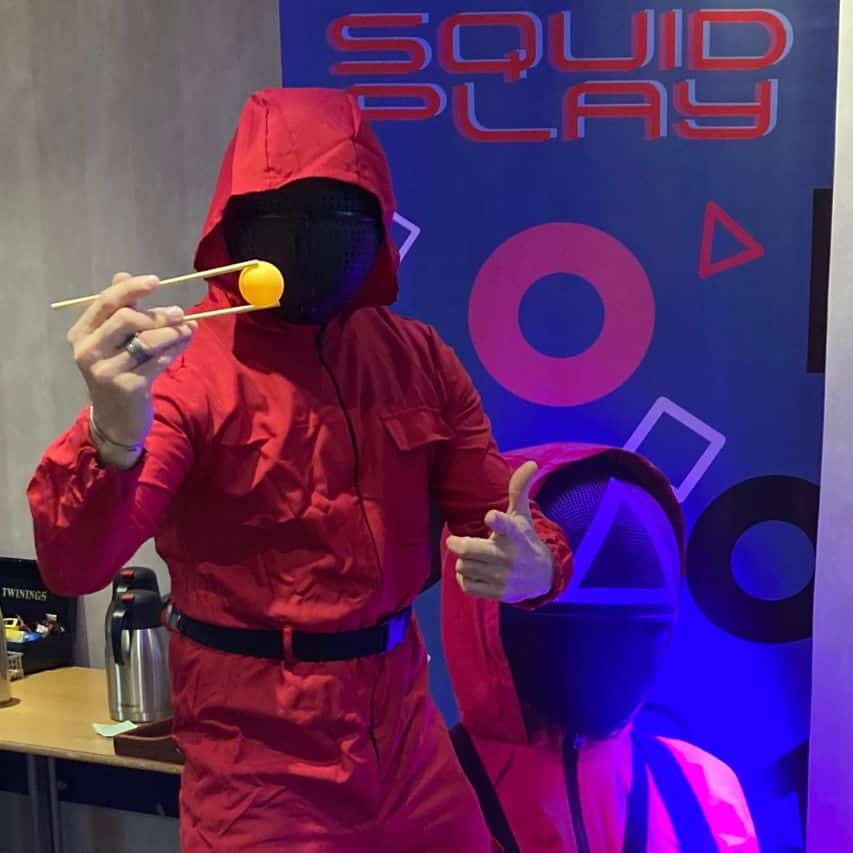7 Expert Insights: What Is Team Building and How to Get It Right
So, let’s dive in: what is team building? This phrase might feel familiar but vague — you’re organising a session for your department, thinking about those dreaded ice-breakers and hoping people don’t roll their eyes. But done well, team building can genuinely shift the performance, trust and culture of your team.
If you’re a PA (organising your first event) or an HR director who wants something that actually works, this guide is for you. And yes — we’ll weave in how a seasoned team building company like Zing Events (600+ five-star reviews, FTSE 500 clients) would advise you — without making this a sales pitch.
What Is Team Building – the definition and purpose
When someone asks “what is team building?” the simple answer: it’s the process of helping a group of people work together more effectively towards a shared goal. In the workplace, it means strengthening relationships, clarifying roles, boosting trust, and creating behaviours that make collaboration smoother.
Importantly: team building is not just one off fun and games. That’s the trap. It’s a strategic effort. According to one definition: “the action or process of causing a group of people to work together effectively as a team, especially by means of activities and events designed to increase motivation and promote cooperation.” Cameron House Resort
For you organising this: it means your event needs a purpose, not just a party. And your chosen provider (yes: team building company) needs to deliver that purpose. If you’re planning team building activities London-based (or UK wide), you’ll also want something reachable, high-quality and aligned with your goals.
Why is team building important?
Because a team that works together well is more than the sum of its parts. When trust is present, communication flows, mistakes get flagged early, and people step in rather than point out. For example: teams with high engagement show significantly better business outcomes — one stat says engaged employees show an 18% increase in productivity. Virtual College+1
Also, in survey after survey, workplace culture is flagged as a key driver of retention, performance and employee mood. When you’re under pressure to “get it right”, the last thing you want is an event that feels pointless. Effective team building helps culture, trust, and the very glue that holds teams together.
When to run team building – trigger moments
It’s not only when you’re thinking “let’s have a fun day out”. There are specific moments when team building is especially beneficial:
-
A new team or newly-formed group: people don’t know each other well yet.
-
A team that’s just merged, reorganised or had a big shift (remote to hybrid, new manager, etc).
-
You’re noticing trust issues, silos, poor communication or low engagement.
-
You’ve done one event years ago and now need to refresh things.
-
You’re planning something outside the day-job (e.g. planning strategic kick-off) and want the relationships in place first.
If you’re organising team building activities London style, or across the UK, then timing is key. Don’t jam it in during a busy deliverable week. Aim for a time when you can give your team the licence to breathe. The investment shows just as much in how you schedule it as what you do.
How to define goals before you book
Before you pick suppliers, venue, games, ice-cream: answer why you’re doing it. Good questions:
-
Do I want better communication between teams?
-
Is trust low? Are people unaware of each other’s strengths?
-
Is creativity or fresh thinking needed?
-
Do I want to reward the team? Or fix a problem?
-
Is the event about relationships, or about skill building?
Write your top 2–3 goals. For example: “Team X needs to feel comfortable speaking up in meetings” or “We want cross-department collaboration to improve by next quarter”. Then pick activities aligned with those.
What good team building looks like
There’s a lot of rubbish out there (yes, we’ve seen it). The article “Stop Wasting Money on Team Building” from Harvard Business Review makes that point loud and clear. Harvard Business Review
So how do you spot the good stuff? Here’s a table to help:
| Feature | Why it matters |
|---|---|
| Clear alignment to your goals | Avoids the “fun day for fun’s sake” trap |
| Inclusive for all participants | Ensures everyone feels involved (not just the few extroverts) |
| Mix of challenge & reward | Helps people stretch in a safe environment |
| Good facilitation | You’ll want a host with experience, someone who keeps things on track |
| Debrief & follow-up built in | The real value comes when you reflect and embed the learning |
| Suitable for your group size, location & budget | If you’re in London or wider UK, locality, travel logistics and accessibility matter |
For example, Zing Events delivers indoor, outdoor and evening experiences across London, the UK and globally. Our experiences build trust, creativity, accountability and collaboration—and are hosted by charismatic professionals who turn ‘team time’ into unforgettable memories.
The role of a team building company
If you’re short on time (hello busy PA) you might just outsource the whole thing. A decent team building company will:
-
Help you clarify the objectives.
-
Design a programme (e.g. indoor, outdoor, evening) that fits your group, budget and context.
-
Manage logistics (venue, facilitator, materials).
-
Guide the debrief so that you capture learning and embed it back at work.
When you choose carefully, you free yourself from the admin mess and focus on the fun and the outcomes.
Types of team building activities you can pick
Here’s a run-down of styles, with examples from both indoor/outdoor/evening. If you’re organising for your team, especially in London or UK, you’ll appreciate the variety.
Indoor activities
-
Escape the Box: problem-solving under time pressure, great for communication and quick decision-making.
-
Animate: fun, creative drawing/storytelling challenge.
-
The Apprentice: pitched task, teamwork, creativity and presentation.
-
Trading Floor: simulation of market or trading environment — high energy.
-
Rollercoaster: teams build a route/structure under constraints.
-
Putt a Hole in Hunger (Indoors): charity element built in — great if you want social purpose.
-
Squid Play Game Show (inspired by Squid Game): pop culture, fun, high-energy.
-
Deceivers Game Show (inspired by The Traitors): trust, psychology, fun twist.
Outdoor activities
-
Soap Box Derby: build a cart then race it — collaboration and fun.
-
GPS Adventurer: navigation, outdoors, team planning.
-
Sphere (Outdoors): obstacles, teamwork, fresh air.
-
Back to School Sports Day: nostalgic, physical, inclusive.
-
Team Survival: survival-style challenge, trust and decision making.
-
Escape the Box (Outdoor version): same concept but outdoors.
-
Putt a Hole in Hunger (Outdoors): charity, fun, fresher air.
-
Race Around the World: global theme, multi-task, great for large groups.
Evening activities
-
The Zing Show: entertainment, bonding, laughter.
-
No Ordinary Quiz: competitive and fun but light.
-
Musical Bingo: inclusive, relaxed.
-
Pub Games: informal but makes memories.
-
Generation Game: nostalgia, inclusive fun.
-
Murder Mystery: creative, story-driven, memorable.
By picking the right format you match the style to your team. If many of your team work remotely or just don’t love physical challenges, maybe indoor or evening options work better. If you have an energised group and good weather, outdoor might hit the sweet spot.
How to pick the right activities
Here’s a quick checklist so you don’t pick something because it looked flashy but isn’t right for your team:
-
Check participant profiles — mobility, preferences, ages, physical ability.
-
Match to goals — if trust is the issue, pick something requiring reliance on others (eg Team Survival).
-
Check timeframe & budget — half-day vs full-day vs evening.
-
Location logistics — if many are London-based, minimise travel. For team building activities London city centre can reduce wasted transit time.
-
Ensure inclusivity — make sure no one feels left out or unable to participate.
-
Ask about debrief/follow-up — an activity without reflection is a missed opportunity.
How to measure success
One of the things that worries first-time organisers: “How will I know if this actually worked?” Good question. Here are some ways to measure and show impact.
Pre & post check
Ask the team before the event: how comfortable are you collaborating with others? how well do you understand your colleagues’ strengths? After the event, ask again. Look for improvements.
Behavioural indicators
-
More cross-team communication.
-
Fewer misunderstandings.
-
Meetings start and finish on time.
-
More people speak up.
-
You see more innovation, fewer conflicts.
Use simple metrics
-
Participation rate at the event.
-
Internal survey scores.
-
New ideas generated during the event.
-
Post-event follow-up actions completed.
Link to outcomes
If you saw more engagement, trust and collaboration, that often links to better performance. One stat: teams with high engagement show up to 18% more productivity compared to those less engaged. Virtual College
When you present ROI to a senior manager or CEO, show that building a strong culture and team leads to fewer leave-rates, better ideas and smoother delivery.
Common pitfalls & how to avoid them
Since you’re aiming to “get it right”, beware these traps:
-
No clear purpose — you end up with a “fun day” that’s fun but nothing changes afterwards.
-
Too big a group or too generic an activity — your team size, dynamic or issues matter.
-
Ignoring accessibility/inclusion — one member can’t physically do the activity; that kills morale.
-
No follow-up — people forget what they learned the next Monday.
-
Poor facilitation — if the host is amateur, things can go off piste or feel awkward.
-
Location & logistics stress — overly long travel time, dinner afterwards finishes too late, tired participants.
Avoiding these makes you stand out. As the organiser, you gain trust from your colleagues and the boss when it runs well.
Checklist for organising your team building event
Here’s a practical planner you can keep handy (especially useful for busy PAs organising for the first time).
| Step | Task |
|---|---|
| 1 | Clarify goals (2-3) for the team building session. |
| 2 | Confirm budget, headcount, time-frame, location. |
| 3 | Choose activity style (indoor/outdoor/evening) aligned to your team. |
| 4 | Select a credible team building company and check reviews (look for providers with strong corporate experience). |
| 5 | Book date/venue and ensure accessibility/inclusion. |
| 6 | Communicate to participants: agenda, expectations, dress code (if any), any pre-work. |
| 7 | Run the event with good facilitation and ensure debrief/reflection time. |
| 8 | Follow up with team: feedback survey, key take-aways, action-items. |
| 9 | Measure success: compare pre/post feedback, look for behaviour change. |
| 10 | Embed learning: revisit the activity when you next meet, reference it in monthly meetings so it’s not a one-day wonder. |
For example, if you pick an evening session after work, ensure the agenda finishes at a convenient time. If you choose outdoor team building activities, check weather backup and travel time if you’re in London or spread across UK offices.
Bonus tips from experienced organisers
-
Split large teams into smaller groups early — 20+ participants can dilute the engagement.
-
Mix up seniority so people outside usual silos talk to each other.
-
Use “micro-challenges” inside the bigger event to keep energy up.
-
Make sure reflection time is built-in (e.g. after round one, what did we learn?).
-
Use the event to surface subtle issues (if trust is low) rather than broom them under the carpet.
-
Capture moments (photos, quotes) to embed the memory back in the office.
-
Link back to business goals — after your event, mention in your next team meeting: “Remember when we did X? Let’s apply that here.”
How to ensure follow-through
A day of fun or challenge isn’t worth much if Monday comes and everything goes back to old habits. Here’s how you keep the momentum:
-
Create one action item per team arising from the event and assign ownership.
-
In your next meeting, reference something from the event (“When we were doing the Race Around the World challenge, we found… let’s apply that here”).
-
Add reminders to build it into routine: e.g. monthly mini-sessions or check-ins.
-
Measure changes in meeting dynamics, collaboration and cross-team behaviour.
-
Share success: send a summary email to team highlighting achievements, dynamic changes, and next steps.
-
If you used a team building company, ask for post-event resources (photos, summary of behaviours observed) to reinforce the learning.
Real-life example (on a budget)
Imagine: You’re the PA for a team of 15 in London. Budget is modest but you still want impact. You choose an indoor session with a twist: go with something like Escape the Box (problem-solving indoors) + evening pub games (post-event casual bonding). Facilitation by the team building company ensures the puzzle reflects one of your business challenges: “How can cross-department communication improve in our next campaign?”
After the event, you send a recap, ask each person to write one action they’ll do differently, and follow up in four weeks in a meeting asking: “What have you changed since the event?” You notice email threads reduce, more people attend each other’s meetings, and you capture that as success. You’ve done team building activities London-friendly, fit budget, and aligned to your goal.
Final thoughts — and your next step
By now you’ve tackled: what is team building, why it matters, how to plan it, what good looks like, pitfalls to avoid, checklist, follow-through. Your role as organiser doesn’t end when the taxi drops people home. The real value comes when the learning becomes habit.
If you pick a solid team building company with credible experience, the logistics become simpler and you can focus on the outcomes. For example, Zing Events delivers indoor, outdoor and evening experiences across London, the UK and globally — with a focus on trust, creativity, accountability and collaboration. Use that kind of provider to reduce your risk and lift your game.
Start by defining your goals now, then pick a date and format. And don’t treat this as optional. For teams that are going to deliver under pressure, build trust and collaboration now. You’ll thank yourself later.
Before you run off to book your event, remember: you’re not organising a gimmick — you’re orchestrating a strategic investment in your team’s performance.
5-Star Reviews & Trusted Reputation
Check out our 5-star reviews on Reviews.io and Google Reviews. Zing Events is trusted by FTSE 500 companies and loved by teams across the UK.
Related blogs
If you’d like more inspiration:
-
10 Team Away Day Ideas to Boost Company Culture and Collaboration
-
How much does team building cost?
-
Why Team Building Exercises Actually Work
FAQ
Q: What is team building and why should I invest in it?
A: Team building means bringing your people together in ways that help them communicate, trust one another and collaborate. It’s not just a day out — it’s an investment in your team’s effectiveness, rightly timed and aligned to your goals.
Q: How often should we run team building activities?
A: It depends on team maturity, change cycles and budget. For a stable team, once a year plus quick refreshers may suffice. For new or reorganised teams, twice or more may be better. The key is regular, planned interaction not a one-off.
Q: What kind of activities should I pick for my team building session?
A: Choose activities aligned to your goals and your team’s context. Indoor, outdoor or evening each have pros. Examples: indoor puzzle session like Escape the Box, an outdoor challenge like Team Survival, or an evening quiz. Make sure they’re inclusive and fit your team’s style and location (for example if many are London-based).
Q: How do I measure whether the team building worked?
A: Use pre- and post-event surveys asking about trust, communication, collaboration. Look for behavioural changes: more cross-team interaction, fewer silos, increased participation. Use simple metrics and tie back to your stated goals.
Q: I’m organising my first event for the team — what should I watch out for?
A: Clarify goals first. Pick the right format for your team size, budget and location. Ensure accessibility/inclusion. Book a firm partner (team building company) with good reviews. Build in reflection and follow up. And make sure it’s in the calendar when people can actually attend and engage.
Q: Can team building happen remotely or for hybrid teams?
A: Absolutely. Even if you’re partly remote, you can mix formats: virtual warm-up, hybrid breakout groups, then in-person follow-up. The principles stay the same: clarity, interaction, follow-through.
Q: Our team is in London — any specific tips for “team building activities London”?
A: Yes. Because you’re in or around London, ease logistics = better attendance. Pick a central venue or one with easy transport links. Consider indoor options if weather’s uncertain. Choose formats that fit into half-day or evening slots. Keep travel minimal so energy stays high.










